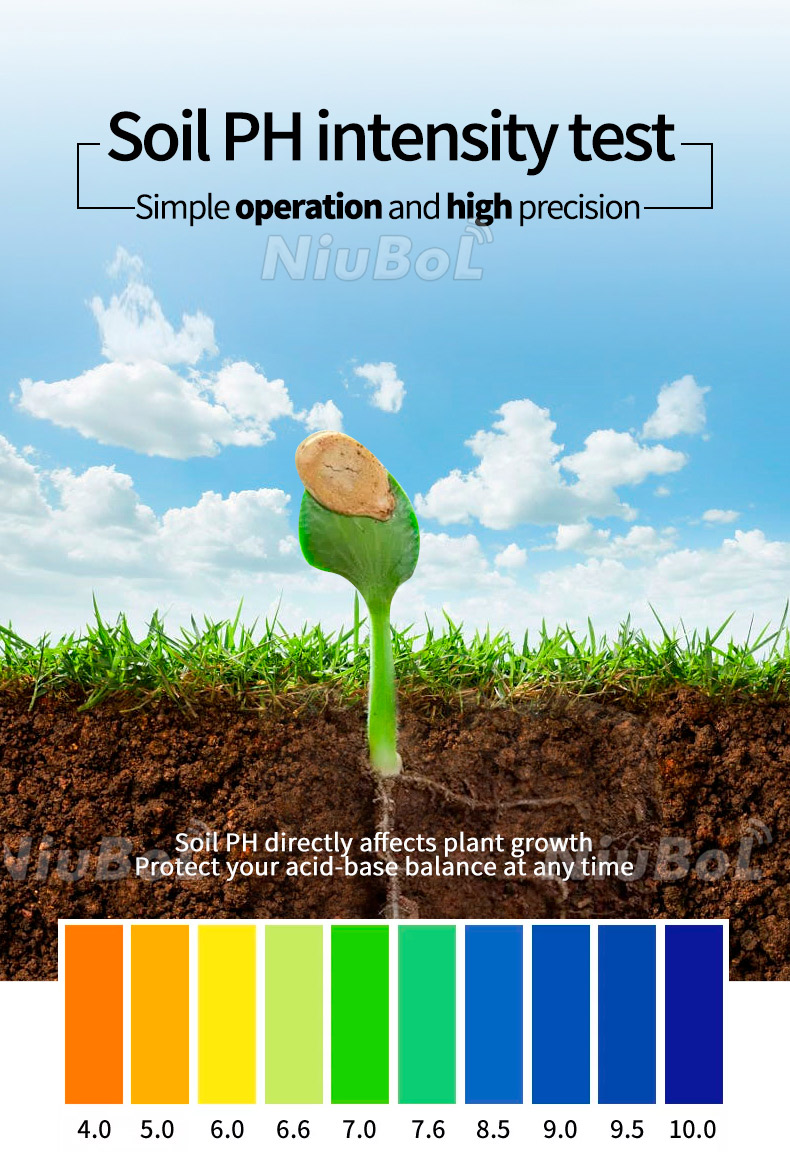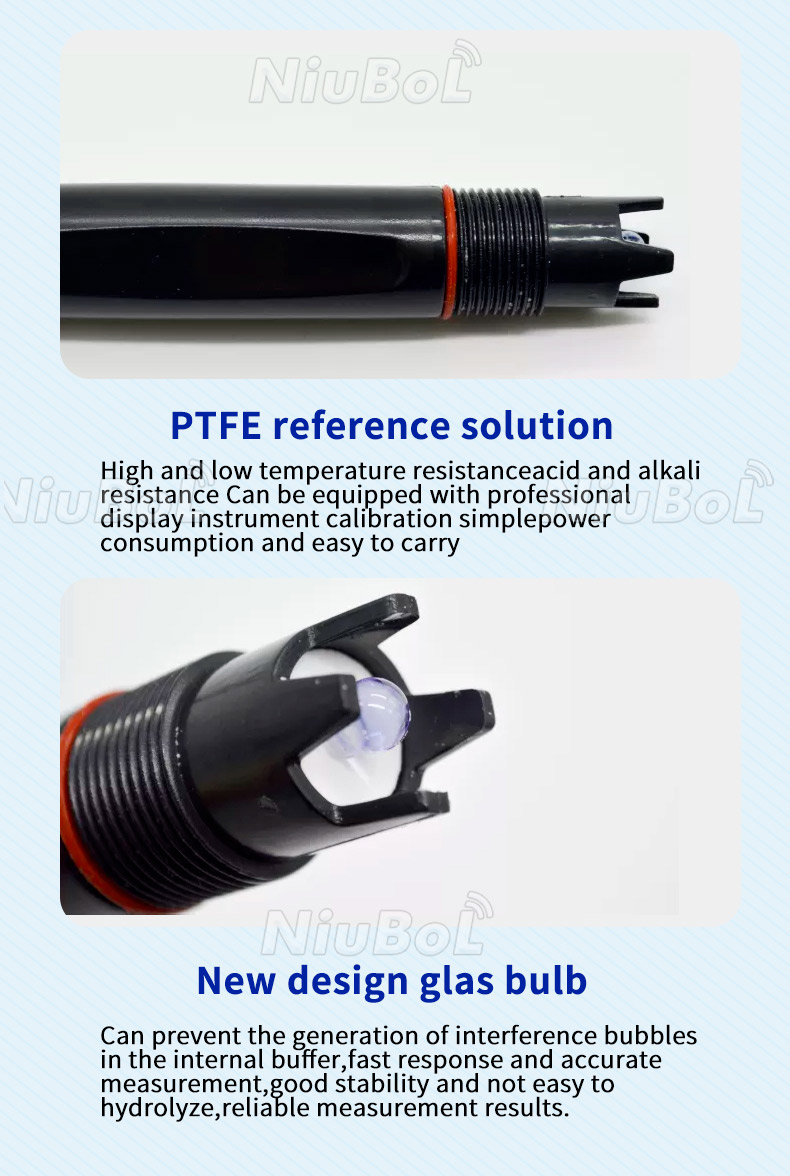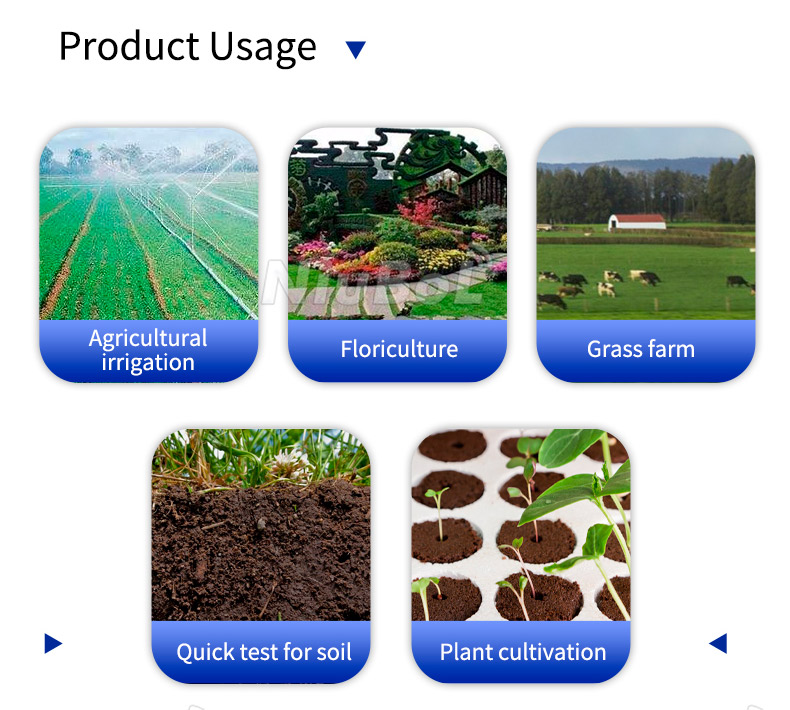

— Blogs —
—Products—
 Consumer hotline +8618073152920
Consumer hotline +8618073152920 WhatsApp:+8615367865107
Address:Room 102, District D, Houhu Industrial Park, Yuelu District, Changsha City, Hunan Province, China
Product knowledge
Time:2024-08-14 17:38:32 Popularity:1085
Soil pH sensor is a precision instrument specially used for measuring soil acidity and alkalinity. It measures the concentration of hydrogen ions in the soil through electrochemical sensing technology, so as to accurately determine the acidity or alkalinity of the soil. The interior of such a sensor usually contains a sensitive membrane and an electrode, which selectively exchanges hydrogen ions with those in the soil, while the electrode is responsible for measuring the pH of the electrolyte solution after the exchange, which leads to the pH value of the soil.
Soil pH is an important indicator of soil acidity and alkalinity and plays a decisive role in crop growth and soil health. The emergence of soil pH sensors facilitates accurate monitoring and adjustment of soil pH. In this article, we will introduce the basic principles and uses of soil pH sensor, price information.

Soil pH sensor has several significant features, such as rapid response, good repeatability, high measurement accuracy, and automatic temperature compensation function, which can maintain the accuracy of measurement results at different temperatures. In addition, the sensor also has high anti-interference performance, can adapt to various soil types and complex soil environment measurement needs.

Soil pH sensor is an important tool for modern agriculture and soil science research, which helps users to accurately grasp the soil condition and provide scientific basis for crop growth and soil health management. Soil pH sensor plays an important role in many fields, mainly including the following aspects:
1. Agricultural production: soil pH is one of the key factors affecting crop growth. Through the soil pH sensor, farmers can monitor the soil acidity and alkalinity in real time, and adjust the soil pH accordingly to provide a suitable growing environment for crops, thus improving the yield and quality of crops.
2. Garden management: In gardening, soil pH is crucial to the growth and beauty of plants. The use of soil pH sensors can help garden managers monitor the acidity and alkalinity of the soil in a timely manner, and adjust fertiliser and nutrient supply accordingly to ensure healthy plant growth.

3. Environmental monitoring: Changes in soil acidity and alkalinity often affect the release of harmful substances in the soil, causing pollution to the surrounding environment. Soil pH sensors can monitor soil pH in real time, providing a scientific basis for the formulation and implementation of environmental protection measures.
4. Scientific research: By measuring the impact of different pH values on soil ecosystems, it is important to study the correlation between soil pH and species range, adaptability and crop growth conditions for ecological and agricultural scientific research.
5. Soil improvement: Knowing soil pH helps to develop soil improvement plans, such as applying lime or sulphur to adjust soil acidity and alkalinity.
The price of soil pH sensor varies by brand, model, accuracy, function and market supply and demand. Soil pH sensors can be searched on major e-commerce platforms and supplier websites at different price points, ranging from tens of dollars to hundreds of dollars. Here are some typical price ranges and representative products:
Economic: relatively low price, suitable for home gardening and small-scale agricultural production. For example, the price of some simple soil pH sensors may range from $5 to $20.
Mid-range: more versatile and suitable for medium-scale agricultural production and landscaping. The price of these sensors is generally between USD 90 and $200, with high measurement accuracy and stability.
High-end type: with intelligent, automated functions, can be combined with other agricultural information technology to achieve automatic monitoring of soil pH and data analysis. The price of these sensors can reach several 300 USD or even more.
Please note that the above prices are only examples, and the actual purchase should be made according to specific needs and budget. At the same time, it is recommended to carefully understand the product performance parameters, user reviews and after-sales service information to ensure that the purchase of cost-effective soil pH sensor.
Summary:
The soil pH sensor is an advanced measurement tool specifically designed to monitor the acidity and alkalinity of soil in real time. It overcomes many limitations of traditional methods, such as the need for professional equipment, complex calibration, high power consumption, not portable, etc., and simplifies the process of soil pH measurement through intelligent design.NiuBoL's soil pH sensor's waterproof sealing design, compact size, low power consumption features, and support for multiple signal outputs, making it possible to be used outdoors for a long period of time, which is very suitable for many fields, such as agriculture, horticulture, scientific research and so on. The sensor is ideal for agriculture, horticulture, scientific research and many other fields. Depending on your needs and budget, you can choose the right soil pH sensor. When purchasing, it is recommended to compare the performance and price of different brands and models to get a cost-effective sensor.
Related recommendations
Sensors & Weather Stations Catalog
Agriculture Sensors and Weather Stations Catalog-NiuBoL.pdf
Weather Stations Catalog-NiuBoL.pdf
Related products
 Combined air temperature and relative humidity sensor
Combined air temperature and relative humidity sensor Soil Moisture Temperature sensor for irrigation
Soil Moisture Temperature sensor for irrigation Soil pH sensor RS485 soil Testing instrument soil ph meter for agriculture
Soil pH sensor RS485 soil Testing instrument soil ph meter for agriculture Wind Speed sensor Output Modbus/RS485/Analog/0-5V/4-20mA
Wind Speed sensor Output Modbus/RS485/Analog/0-5V/4-20mA Tipping bucket rain gauge for weather monitoring auto rainfall sensor RS485/Outdoor/stainless steel
Tipping bucket rain gauge for weather monitoring auto rainfall sensor RS485/Outdoor/stainless steel Pyranometer Solar Radiation Sensor 4-20mA/RS485
Pyranometer Solar Radiation Sensor 4-20mA/RS485
Screenshot, WhatsApp to identify the QR code
WhatsApp number:+8615367865107
(Click on WhatsApp to copy and add friends)
